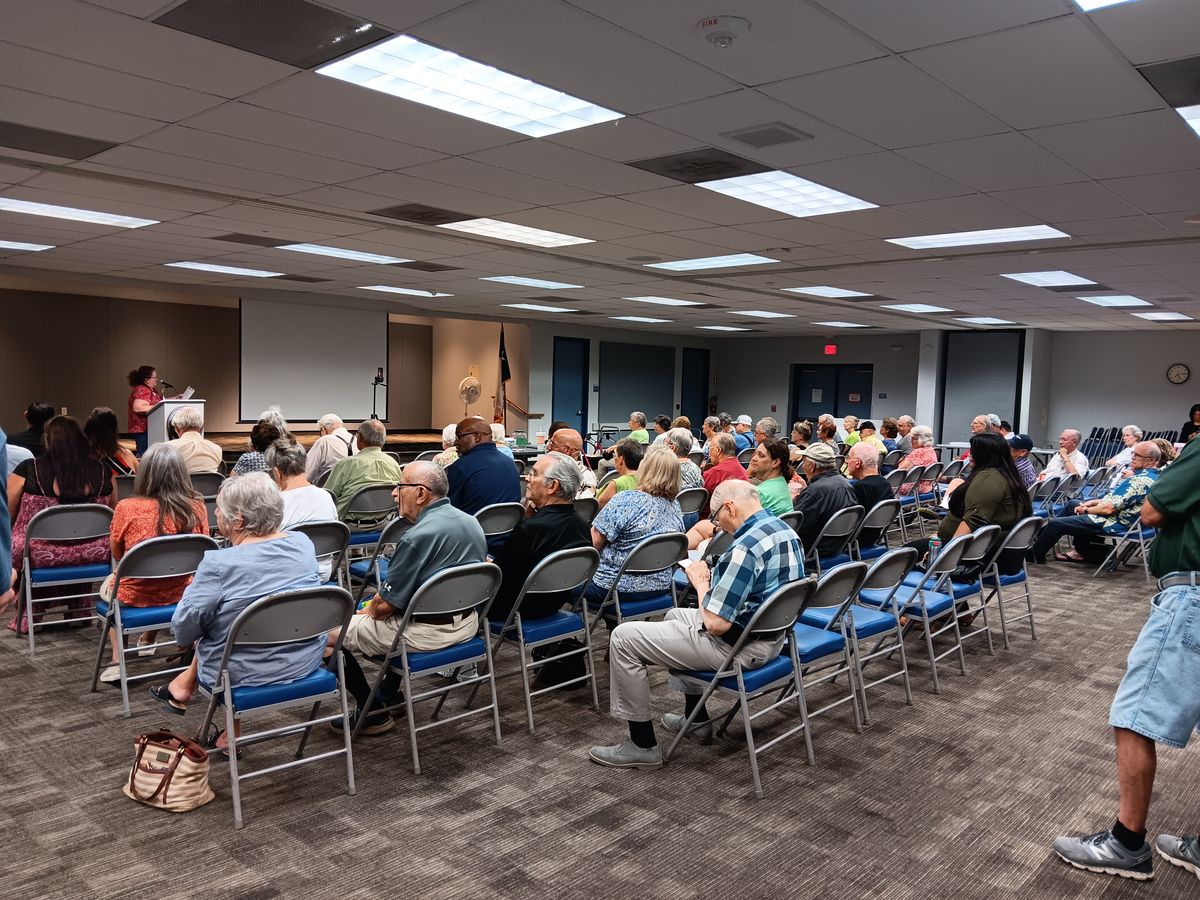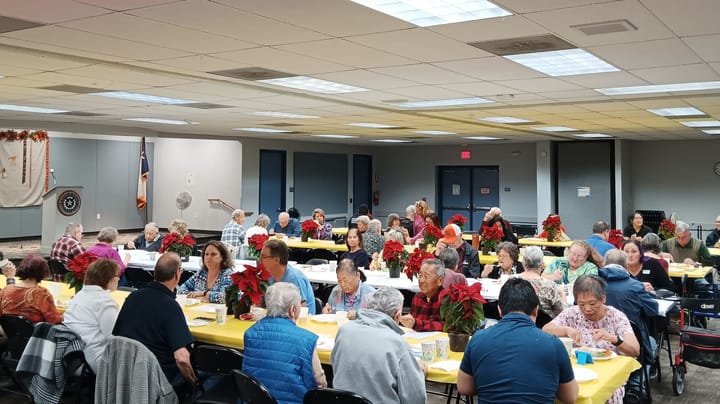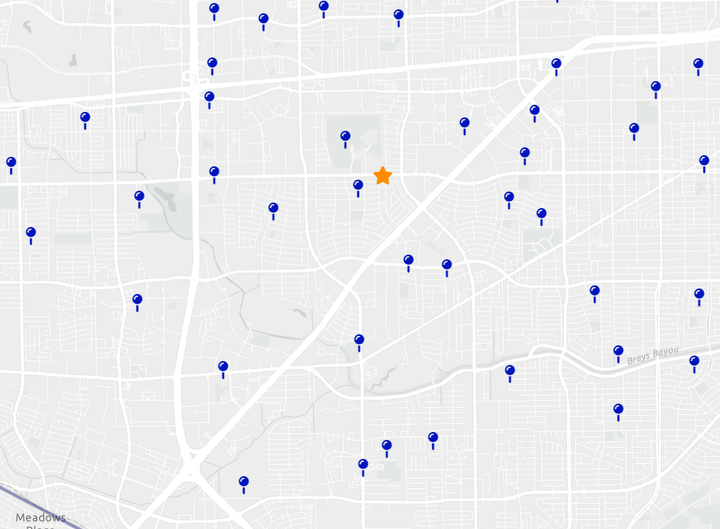Bye-Bye to Bylaw Changes (for Now): 65 Ballots Decide the Sharpstown Civic Association’s Future

Approximately one hundred people filled the blue chairs or stood along the walls in the Bayland Community Center on August 24, 2023. Sixty-six of them held purple ballots with three options: yes, no, or abstain. Soon, all but one of those ballots would be cast.
Outside the door to the center, Bernardo Eureste passed out sheets of paper that read “Sharpstown Civic Association Is At It Again…WE ASK YOU TO VOTE NO!!!”
The members were voting on whether to change the bylaws of the Sharpstown Civic Association, a nonprofit that uses voluntary membership dues to enforce deed restrictions for the approximately 7,000 homes in Sharpstown.
The sheets handed out by Eureste listed four points of disagreement with the bylaw changes. Before the meeting, Sharpstown residents Mary Pinto and Mel Babb studied the sheets, unsure of how they should vote. “I’m going to pray,” said Pinto.
Why was the vote so contentious? Here are some of the most significant things the bylaw changes would do:
- Require members to serve at least one year on the elected volunteer board (at some point during their lifetimes) before being eligible to run for president, vice president, secretary, or treasurer.
- Allow a board member or officer to be removed for missing three meetings in a year. (The current bylaws only state that a board member or officer can be removed for missing three “successive” [back-to-back] meetings.)
- Allow a two-thirds majority of the board members “present at a regularly scheduled meeting” to remove another board member or officer “with or without cause” if that member was provided with 14-day written notice before the vote.
- Allow “corporations who are members” of the SCA to vote by sending a “designated representative.”
Former SCA President Jim Bigham had problems with the bylaw changes—especially the rule about voting off board members. After all, “We do not allow the next city council to vote off the person we just elected.”
He also said that under Texas law, any corporation already has the power to designate a representative to come to meetings, making the fourth change unnecessary. He was concerned that it might allow current SCA officers to go to corporations, ask them to support their favored candidates, and ask to be made designated representatives for those corporations.
Another Sharpstown resident, Dominique Varner, thought the changes were “very reasonable,” especially the requirement that officers have one year of board experience. Former SCA president Margaret Mitchell agreed, saying that when someone goes from being a regular member to joining a board, there’s a “learning curve.”
Mitchell didn’t want a newly elected officer to come in and say, “I’ve never been part of this before. I’m gonna be your treasurer. I’m gonna pay your bills.” She also thought that the word “consecutive” (she meant “successive”) “should have been removed a long time ago.”
Varner was less convinced about the rule allowing two-thirds of the board to remove a board member for any reason (or no reason). She said she understood why it was proposed, but “That’s not really a standard bylaw.”
Mitchell said, “There’s never no reason…Two thirds of the board is not going to wake up one day and decide” to pointlessly remove a member. But “I can see both sides of that one too.”
Varner suggested, “Maybe instead of all the bylaws being up for vote, we should do them one at a time…so people don’t throw out the baby with the bathwater.” But at the meeting, it was all or nothing. Approve all of the bylaw changes, or reject all of them.
The meeting began at 7:01 PM with the ChristChurch Presbyterian Boy Scout Troop presenting the flags and leading the Pledge of Allegiance. SCA vice president Matt Wine announced the beginning of the voting.
65 households turned in ballots (one member did not because she felt that she hadn’t educated herself enough beforehand).
While the votes were counted, representatives from local schools—including Thomas Cotter, the new principal of Sharpstown High—introduced themselves to the community.
At 7:31 PM, Wine announced that the bylaw changes did not pass.
Several audience members clapped, but most were silent.
Of the 65, 36 voted yes, 26 voted no, and 3 abstained. In other words, 55% favored the bylaw changes, 11% short of the two-thirds majority required to pass. If the changes had passed, they would have gone to a second vote in September. But the failed vote stopped the process cold.
When asked if bylaw changes would be submitted to the members again anytime soon, SCA President Charmaine LeBlanc said, “A couple of the things are legislatively dictated…our attorney said, ‘You have to make these changes.’”
Three people told LeBlanc they didn’t know about the vote but would have told their neighbors.
“Perhaps we should have done a mailing to everybody,” said LeBlanc. The SCA announced the bylaw changes at previous general meetings, which are usually attended by forty to sixty people, and in an email blast sent on Friday, August 18, less than one week before the vote.
For better or for worse, the bylaw changes were defeated. But it’s sad that, in a neighborhood of 7,000 homes, the fate of the local civic association can be decided by 65 ballots.



Comments ()